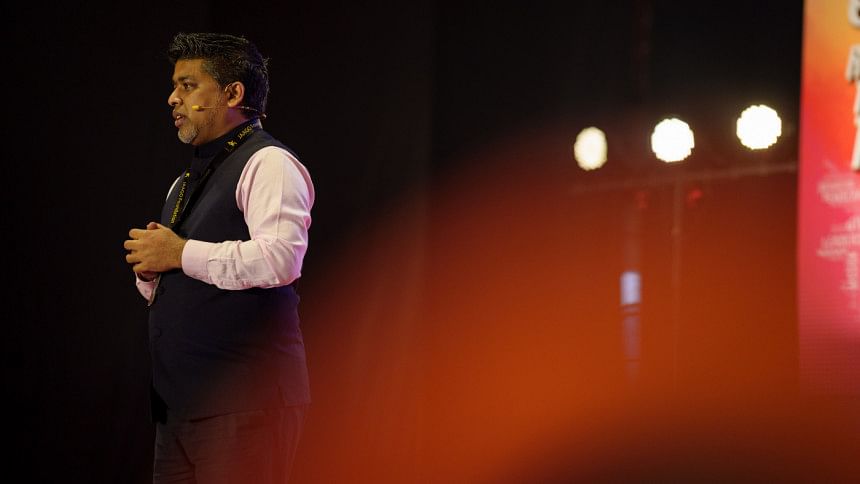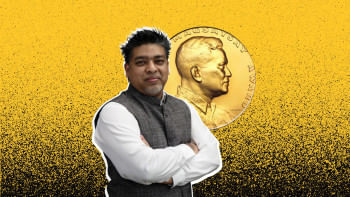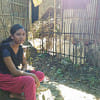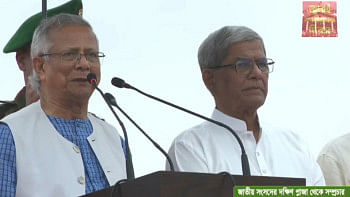In conversation with Korvi Rakshand, 2023 Magsaysay Award winner

Korvi Rakshand Dhrubo, founder and CEO of Jaago Foundation, has recently received the Ramon Magsaysay Award, also called the 'Nobel Prize of Asia', an award that recognises individuals with notable contributions to public service, community leadership, and social development. Since the award's inception in 1957, 13 Bangladeshis have received it. We recently caught up with Korvi, the newest addition to this list, to learn more about Jaago's achievements as well as his journey and experiences.
Congratulations on winning the award. How does it feel to receive such recognition for your work with the Jaago Foundation?
Thank you. I am very humbled and grateful to the board of trustees for recognising our work and making us a part of such a prestigious network. It feels surreal to be among the likes of the Dalai Lama, Mother Teresa, Sir Fazle Hasan Abed and Prof Muhammad Yunus among many others.
To be very honest, I was completely unaware of the ongoing evaluation process and realised that they had been tracking our work for the past five years. Although I remember sitting for an interview in 2017, the announcement came as a pleasant surprise. This award is not just for me but for the entire community of Jaago, including all our students, volunteers, and kind donors.
Could you share with us the story behind the founding of the Jaago Foundation? What inspired you to start this organisation, and what were your initial goals?
I have been involved in charity work since childhood but realised that my efforts were making people lazy and developing dependency on aid. To create something more sustainable, I decided to work in the education sector. I travelled across Bangladesh to understand the lives of people and met a seven-year-old orphan who wanted to accompany me home. The guilt of being helpless then led me to establish the Jaago Foundation in 2007.
We began by teaching English to 17 children in a slum. The goal has always been to impact people's lives through education, but our approach has evolved to include these children in mainstream education. While we started as an English medium school, we later changed the curriculum to an English version considering the feasibility and future potential. Our journey had many failures and moments of truth, what made us succeed was being firm to our goal while embracing changes with an open mind.
The Ramon Magsaysay Award is often referred to as the 'Nobel Prize of Asia'. How do you see this award impacting your organisation and the causes you advocate for?
This award is going to open new doors and avenues for our organisation. With more than 350 awardees, it promises a prestigious networking opportunity where we could learn from social leaders while also presenting ourselves as an example of youth leadership. Jaago Foundation's unique schooling model could be taken to different countries that face similar problems. Moreover, we could take the volunteer network model to different countries.
Jaago Foundation has made significant strides in promoting education and social awareness in Bangladesh. Can you highlight some of the key achievements or projects that you're particularly proud of?
At Jaago Foundation, we always focus on quality over quantity. Our achievement lies in the fact that children like Siam, who wanted to be a rickshaw puller, are now studying in top universities in the United States. Last week, our student Tamanna got accepted into UWC Armenia with a USD 90,000 scholarship package. It is a matter of immense pride that three of our students are presently pursuing their higher education abroad while around 20 students are enrolled in Bangladeshi universities.
So far, we have been able to impact 30,000 students as our direct beneficiaries. In terms of current projects, we are teaching 13,500 children in Bandarban through a project in partnership with UNICEF and FCDO. We are also working with communities in Mithamain to empower female education and improve their enrolment rate.
Education is a cornerstone of Jaago Foundation's mission. Could you elaborate on how the foundation approaches education in a way that sets it apart from other initiatives?
When we started working, nonprofit organisations did not incorporate formal education channels. Providing prolonged education was a costly initiative and it was challenging to find donors who would continue to finance projects for years to come.
Our Digital School Program is funded by individual sponsors for each child. While donors often would contribute for 2-3 years, the sponsor has a lifelong relationship with the beneficiaries. We have developed a unique model by identifying that individual sponsors are much more sustainable.
At Jaago, anyone can sponsor a child's schooling by contributing BDT 2,000 each month. Last year, we introduced scholarship programs for women in public universities. We managed to help 100 students in 2022, and have enlisted 160 students for this year.
Jaago's work goes beyond conventional education and extends to broader community development. Can you share some examples of how it has positively influenced the communities it serves?
While working with education, we have also facilitated teachers' training and skill development in the process. Our online model has created several job opportunities for skilled youth and enables them to develop themselves. We have witnessed that community development and youth engagement increase significantly among our beneficiaries.
We founded Volunteer for Bangladesh in 2011, with 40 young people in Dhaka who wanted to work for society. The idea rapidly spread across all districts and presently we have 50,000 young people working as a community of changemakers. They elect their local leaders and the power is completely decentralised to ensure grassroot-level efficiency. We also have more than 50 volunteers abroad, and this growth has been very organic indeed.
Collaboration and partnerships often play a crucial role in achieving sustainable change. How does Jaago Foundation collaborate with other organisations, government bodies, and stakeholders to amplify its efforts?
We are working on an interactive website with a list of all organisations working with specific goals, to ensure the optimum utilisation of resources. To maximise efficiency, we have planned to conduct sessions in Department for Youth Development (DYD) centres, employing local resources. Finally, we are working with the Youth Ministry to launch youth development programs and provide skill-based training to 55,000 young people with no formal education. The program will be based in Dhaka and Chattogram and run for the next five years. This program also involves corporates to address the skill gap issue and ensure effective training for the youth.
The award not only acknowledges your achievements but also inspires others to follow in your footsteps. How do you plan to engage with the next generation of changemakers through your work and experiences?
As of now, we have initiated a program to support the growth of other youth initiatives for the next two years. We would be incubating 30 youth-led organisations, where we would teach them how to create policies or approach donors for funding. The next agenda would be to expand our network to all 495 upazilas since we already have teams in all 64 districts. What we follow is a cascade-down model, and our upazila teams would be coordinated by our district teams. It will take time but it will happen.
What advice do you have for young individuals who aspire to make a difference in their communities and address pressing social challenges?
This world is the best gift we have received from our Almighty and we need to take care of it together. From my experience, we never had a set goal, and designed programs to solve a new problem that arises. All we knew was that we wanted to solve a core issue in a sustainable approach.
I would emphasise the importance of teamwork because when you have a good team, the organisation just keeps evolving along the way. If you want to go fast, go alone, but, if you want to go far, walk together. Discuss your ideas with the team and take their feedback. As a founder, you should always keep your mind open to new and young ideas.

 For all latest news, follow The Daily Star's Google News channel.
For all latest news, follow The Daily Star's Google News channel. 







Comments